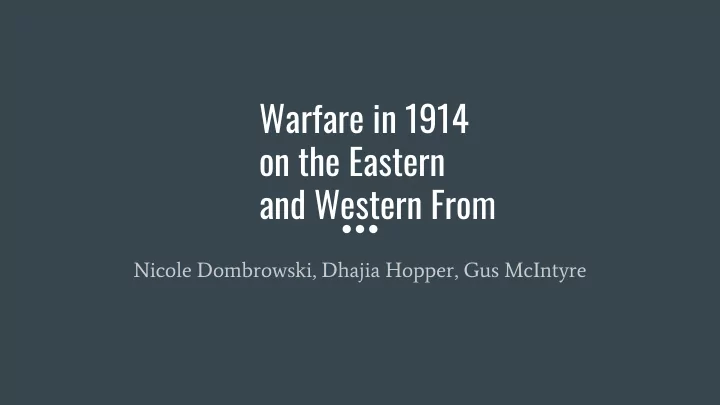

Warfare in 1914 on the Eastern and Western From Nicole Dombrowski, Dhajia Hopper, Gus McIntyre
Introduction: Timeline of Events Battle of First Battle of Tannenberg Ypres Aug. 26-30 Oct.19- Nov.22 Sep. 5-12 Dec. 25 First Battle of the The Christmas Marne . Truce The Great War in 1914
Battle of Tannenberg-The Basics August 26-30, 1914 ● Battle on Eastern Front ● Germany vs. Russia ○ Russians lost. By a lot . ●
Battle of Tannenberg-How did Germany Win? Russia’s Sketchy Army ● ○ Provisions Uncoded wireless communications ○ Positioning ○
Battle of Tannenberg-Aftermath Important Figure: Paul von ● Hindenburg Now a national hero ○ Diverted troops from Western Front ●
First Battle of the Marne-The Basics September 5-12, 1914 ● French army and BEF take a stand on ● the Marne Forced German retreat back across ● the Marne
First Battle of the Marne-Details Germany’s positioning (and flanks) ● Means of battle ● German retreat ●
First Battle of the Marne-Aftermath Killed the Schlieffen Plan ● “Miracle of the Marne” ○ End of fast, mobile warfare ● ○ (It’s trench time) French morale improved ●
First Battle of Ypres- Basics October 19-November 22, 1914 ● Battle on north coast of Belgium. ● Intended to control ports leading out ● to the English Channel. Between Germany and Allies ○ Both sides suffered heavy losses ● The battle ceased when winter set in ●
First Battle of Ypres-Why did it Occur? Germany lost in the Battle of the ● Marne They were looking for their next strategic ○ battle Both sides bagan to try to outflank ● the other, eventually ending up on the Belgian coast. ○ This was later called the race to the sea.
The First Battle of Ypres- What Occured? Allied forces outnumbered, short on ● artillery Germans pushed the front line back, ● support from BEF brought back some ground War of attrition ● Many small-scale attacks ○ Many casualties ○
Battle of Ypres- What Occurred? (Cont.) Germany attacked on the 20th, the this almost pushed ● the allies back into Ypres itself, and because the allies were surrounded on three sides of the city, they tried to plans an offensive that would push Germany back a little. Both sides planned to attack first, Germany actually did ● The Allied line was broken, but Germany was not able ● to take advantage of it. Fighting ending in winter ●
The First Battle of Ypres-Significance This battle marked the end of the movement of ● the front lines. Both sides dug large and complex trench systems ● on their front. This battle showed how neither side could really ● win, and was the first example of how the western front was just a big stalemate. Showed the first “war of attrition” and showed ● how terrible of a battle this would be.
Christmas Truce December 25, 1914 ● Official truce was proposed, warring countries ● refused ○ Unofficial truce on Christmas of 1914 Gesture of goodwill for the holiday ●
Christmas Truce-What did it entail? Most news reports focused on football ● games Letters and parcels to the British ● Even boxes for Germans ○ Coral sing offs, festive wreaths, and table ● top trees Resulted in truces being punishments ● After this, there was to be no more truces. ○
Christmas Truce In Britain, German battleships killed ● 122 and injured 450 civilians Gave need for a cessation of fighting ○ Used to recover+bury dead, help ● wounded, and shore up trenches Angered French, Indian, and Belgian ● soldiers Why show kindness to Germans, the ○ enemy?
Christmas Truce Wasn't the first truce to occur, would ● be the last. High Command made it treason ● Long term=would hurt the war ○
In Summary These four battles were crucial in the ● development of the Great War, in both means and mood Trench warfare ○ Disillusionment ○ Long war ○
Recommend
More recommend